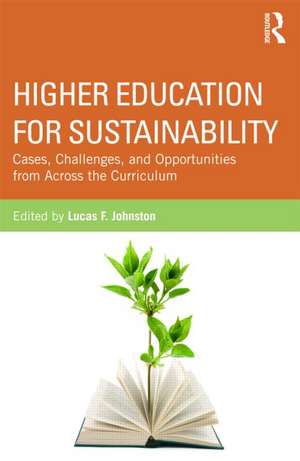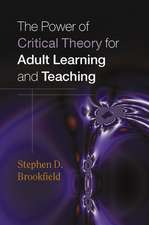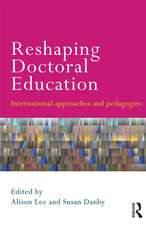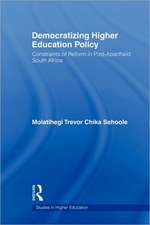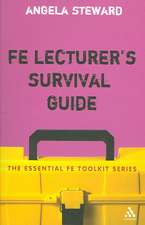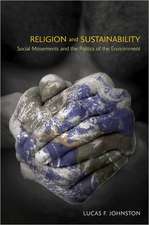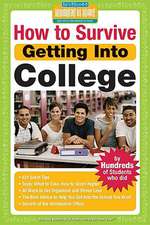Higher Education for Sustainability: Cases, Challenges, and Opportunities from Across the Curriculum
Editat de Lucas F. Johnstonen Limba Engleză Paperback – 26 iul 2012
| Toate formatele și edițiile | Preț | Express |
|---|---|---|
| Paperback (1) | 457.79 lei 6-8 săpt. | |
| Taylor & Francis – 26 iul 2012 | 457.79 lei 6-8 săpt. | |
| Hardback (1) | 1170.84 lei 6-8 săpt. | |
| Taylor & Francis – 26 iul 2012 | 1170.84 lei 6-8 săpt. |
Preț: 457.79 lei
Nou
Puncte Express: 687
Preț estimativ în valută:
87.61€ • 90.38$ • 74.15£
87.61€ • 90.38$ • 74.15£
Carte tipărită la comandă
Livrare economică 04-18 martie
Preluare comenzi: 021 569.72.76
Specificații
ISBN-13: 9780415519366
ISBN-10: 0415519365
Pagini: 272
Dimensiuni: 152 x 229 x 15 mm
Greutate: 0.5 kg
Ediția:New.
Editura: Taylor & Francis
Colecția Routledge
Locul publicării:Oxford, United Kingdom
ISBN-10: 0415519365
Pagini: 272
Dimensiuni: 152 x 229 x 15 mm
Greutate: 0.5 kg
Ediția:New.
Editura: Taylor & Francis
Colecția Routledge
Locul publicării:Oxford, United Kingdom
Cuprins
Foreword: When You Wake Up Tomorrow, Paul Rowland
Chapter 1: Introduction: What’s Required to Take EfS to the Next Level? Dedee DeLongpre Johnston and Lucas Johnston
SECTION 1: Understanding the Landscape for Change
Chapter 2: The Emerging Environmental Sustainability Program at Meredith College: Exploring Student and Faculty Interest and Participation, Laura Fieselman and Erin Lindquist
Chapter 3: Understanding Student Environmental Interests When Designing Multidisciplinary Curriculum, Jeremy T. Bruskotter, Greg Hitzhusen, Robyn S. Wilson, Adam Zwickle
Chapter 4: Learning Outcomes: An International Comparison of Countries and Declarations, Debra Rowe and Lucas Johnston
SECTION 2: Sustainability Across the Curriculum: Strategies and Tactics
Chapter 5: Systems Study of an International Masters Program: A Case from Sweden, Sanaz Karim, Nadarajah Sriskandarajah, Asa Heiter
Chapter 6: Keys to Breaking Disciplinary Barriers that Limit Sustainable Development Courses, William Van Lopik
SECTION 3: Educating the Professional
Chapter 7: Strategies for Transforming Healthcare Curricula: A Call for Collaboration between Academia and Practitioners, Carrie Rich and Seema Wadhwa
Chapter 8: Sustainability and Professional Identity in Engineering Education, Mark Minster, Patricia D. Brackin, Rebecca DeVasher, Erik Z Hayes, Richard House, Corey Taylor
Chapter 9: Implementing Environmental Sustainability in the Global Hospitality, Tourism, and Leisure Industries: Developing a Comprehensive Cross-Disciplinary Curriculum, Michelle Millar, Chris Brown, Cynthia Carruthers, Thomas Jones, Yen-Soon Kim, Carola Raab, Ken Teeters, Li-Ting Yang
SECTION 4: Problem-Based Learning
Chapter 10: Everybody’s Business: Addressing the Challenge of Team-Teaching Partnerships in the Global Seminar, Tamara Savelyeva
Chapter 11: The Moral Ecology of Everyday Life, James J. Farrell
Chapter 12: The Living Home: Building It into the Curriculum, Braum Barber and Leona Rousseau
SECTION 5: Transformational Approaches
Chapter 13: Shaping Sustainability at Furman and Middlebury: Emergent and Adaptive Curricular Models, Angela C. Halfacre, Michelle Horhota, Katherine Kransteuber, Brittany DeKnight, Brannon Andersen, Jack Byrne, Steve Trombulak, Nan Jenks-Jay
Chapter 14: Stepping Up to the Challenge—The Dalhousie Experience, Tarah Wright
Chapter 15: Sustainability as a Transformation in Education, Charles L. Redman
Chapter 16: Toward a Resilient Academy, Richard M. Carp
Epilogue
About the Contributors
Chapter 1: Introduction: What’s Required to Take EfS to the Next Level? Dedee DeLongpre Johnston and Lucas Johnston
SECTION 1: Understanding the Landscape for Change
Chapter 2: The Emerging Environmental Sustainability Program at Meredith College: Exploring Student and Faculty Interest and Participation, Laura Fieselman and Erin Lindquist
Chapter 3: Understanding Student Environmental Interests When Designing Multidisciplinary Curriculum, Jeremy T. Bruskotter, Greg Hitzhusen, Robyn S. Wilson, Adam Zwickle
Chapter 4: Learning Outcomes: An International Comparison of Countries and Declarations, Debra Rowe and Lucas Johnston
SECTION 2: Sustainability Across the Curriculum: Strategies and Tactics
Chapter 5: Systems Study of an International Masters Program: A Case from Sweden, Sanaz Karim, Nadarajah Sriskandarajah, Asa Heiter
Chapter 6: Keys to Breaking Disciplinary Barriers that Limit Sustainable Development Courses, William Van Lopik
SECTION 3: Educating the Professional
Chapter 7: Strategies for Transforming Healthcare Curricula: A Call for Collaboration between Academia and Practitioners, Carrie Rich and Seema Wadhwa
Chapter 8: Sustainability and Professional Identity in Engineering Education, Mark Minster, Patricia D. Brackin, Rebecca DeVasher, Erik Z Hayes, Richard House, Corey Taylor
Chapter 9: Implementing Environmental Sustainability in the Global Hospitality, Tourism, and Leisure Industries: Developing a Comprehensive Cross-Disciplinary Curriculum, Michelle Millar, Chris Brown, Cynthia Carruthers, Thomas Jones, Yen-Soon Kim, Carola Raab, Ken Teeters, Li-Ting Yang
SECTION 4: Problem-Based Learning
Chapter 10: Everybody’s Business: Addressing the Challenge of Team-Teaching Partnerships in the Global Seminar, Tamara Savelyeva
Chapter 11: The Moral Ecology of Everyday Life, James J. Farrell
Chapter 12: The Living Home: Building It into the Curriculum, Braum Barber and Leona Rousseau
SECTION 5: Transformational Approaches
Chapter 13: Shaping Sustainability at Furman and Middlebury: Emergent and Adaptive Curricular Models, Angela C. Halfacre, Michelle Horhota, Katherine Kransteuber, Brittany DeKnight, Brannon Andersen, Jack Byrne, Steve Trombulak, Nan Jenks-Jay
Chapter 14: Stepping Up to the Challenge—The Dalhousie Experience, Tarah Wright
Chapter 15: Sustainability as a Transformation in Education, Charles L. Redman
Chapter 16: Toward a Resilient Academy, Richard M. Carp
Epilogue
About the Contributors
Notă biografică
Lucas F. Johnston is Assistant Professor of Religion and Environmental Studies and a Faculty Associate in the Center for Energy, Environment, and Sustainability (CEES) at Wake Forest University, USA.
Recenzii
"This book can be used in undergraduate courses or as a subject on higher education
for sustainability at the postgraduate level. It can be used as a course manual for career
and vocational training courses and career training classes. Focusing such a relevant
subject, this book can serve as a useful reference for a diversity of professionals, with a
special emphasis to academics, researchers, politicians, administrators, managers, and
engineers that are working in the field of higher education for sustainability."
--J. Paulo Davim, Int. J. Higher Education and Sustainability, Vol. 1, No. 1, 2015
for sustainability at the postgraduate level. It can be used as a course manual for career
and vocational training courses and career training classes. Focusing such a relevant
subject, this book can serve as a useful reference for a diversity of professionals, with a
special emphasis to academics, researchers, politicians, administrators, managers, and
engineers that are working in the field of higher education for sustainability."
--J. Paulo Davim, Int. J. Higher Education and Sustainability, Vol. 1, No. 1, 2015
Descriere
This edited collection provides a glimpse at the ways colleges and universities have integrated sustainability across the curriculum.
